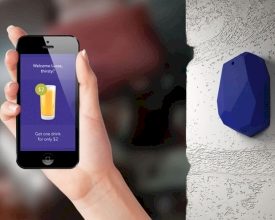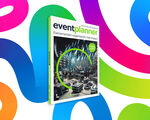iBeacon is making stealthy inroads in the world of events. This technology provides your participants with an even more intense experience. By using iBeacons you can deliver personalized content, organize smooth check-ins and registration, send useful location information... the possibilities are endless.
The iBeacon is actually a small transmitter that works with Bluetooth Low Energy technology (BLE). It's Apple's alternative to Near Field Communication (NFC) that's being built into more and more smartphones. BLE is available on the latest versions of iPhone, iPad, iPod Touch, iPad Mini, Android smartphones and tablets, Windows smartphones and tablets, and BlackBerry smartphones. An important advantage of iBeacons over NFC: the reach is far greater. With NFC, the range is only a few centimeters, with iBeacons it's 50 meters.
How does it work? The iBeacon sends a signal to a mobile device or operating system once it comes within range. Depending on the app, the signal executes a specific task: sending a push message, downloading content, checking in on social media, a payment request...
Retail
Beacons are already widely used in retail. Apple stores use them to send clients information in real time about the devices they are currently viewing in-store. Soon you will also receive purchase suggestions in other stores. In some American clothing chains it's already in use.
Events
But in the world of events, the iBeacon can also be put to good use. Here are some examples:
"Where are the toilets?” This is the question heard most often by information booth staff. Visitors are just too lazy to read the signs. With iBeacons you immediately know where you are - and how to quickly get to the nearest toilet!
You can easily replace USB sticks or promotional brochures with push notifications. Any interested party approaching your stand will automatically get the promotion or information through his or her smartphone.
Gamification is also ideal for use with iBeacons. For example, guide your visitors through your exhibition through a treasure hunt. Or let the visitors to your motor show follow a specific route based on their own preferences. For example, is your visitor interested in hybrid cars? If so, every time he or she walks past a hybrid vehicle, the app will send content about that particular car.
The transmitter can also detect how much time you spend in a certain location. If you're waiting at the entrance, you will receive messages about all scheduled events. You can also easily facilitate registration by sending a QR code to the people gathering your info at the check-in. This will allow you to check in quickly and painlessly.
Another advantage of the iBeacon is that the receiver can also return messages. For example, you can let the caterer know what you want to have for lunch. Finally, iBeacon also offers a great deal of real-time data which is useful for managing your audience as well as the traffic flow at your event.
Disadvantages
The iBeacon does have some disadvantages. Your device must be Bluetooth enabled. Which must be switched on. And that uses battery power. That"s why many users prefer to keep Bluetooth turned off. There are also some privacy issues: When opting-in or allowing an application permission to use your micro location, you are giving away a lot of privacy data. So you need to be really confident about the app asking for your data. Some people also get annoyed by the push notifications sent at convenient as well as inconvenient times by the iBeacons. For example, if you step inside a store, you may receive a constant stream of messages about the promotions inside. And that’s not to everyone's taste.







